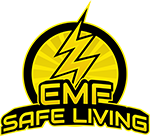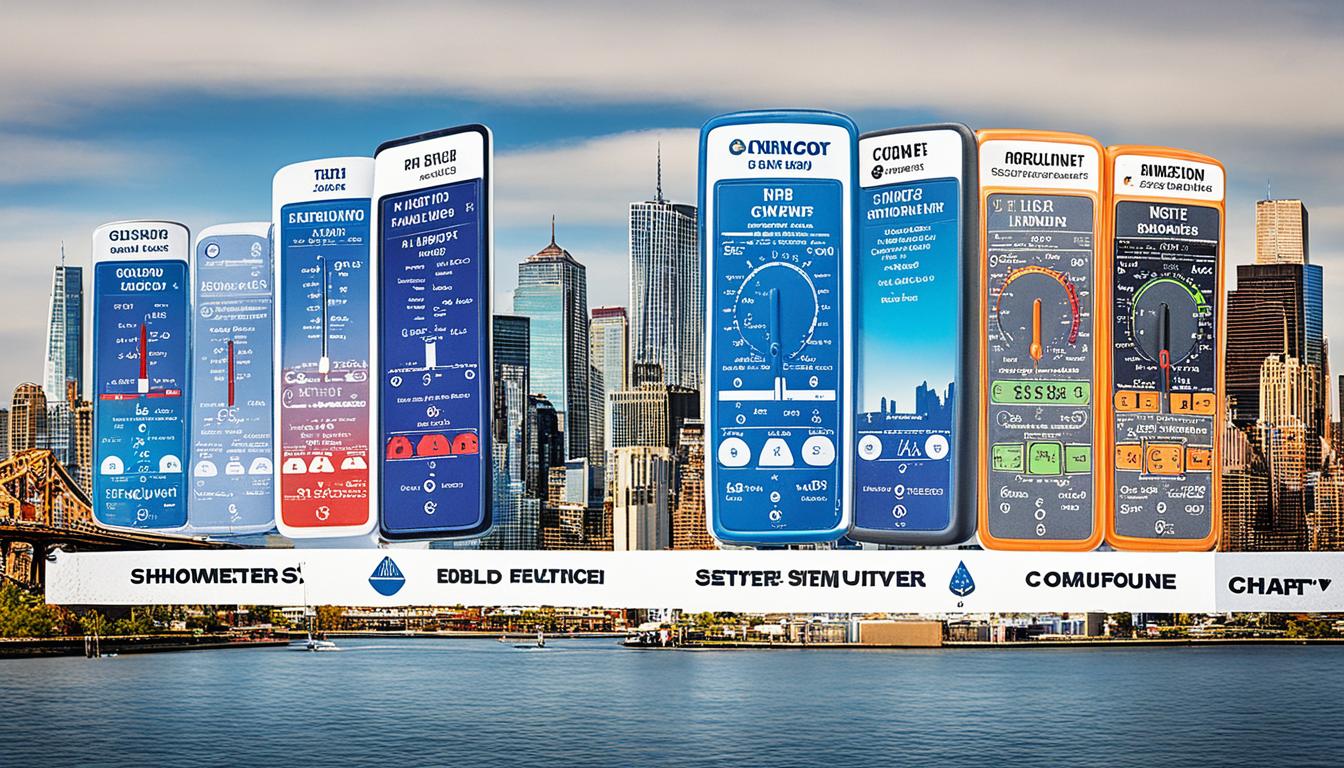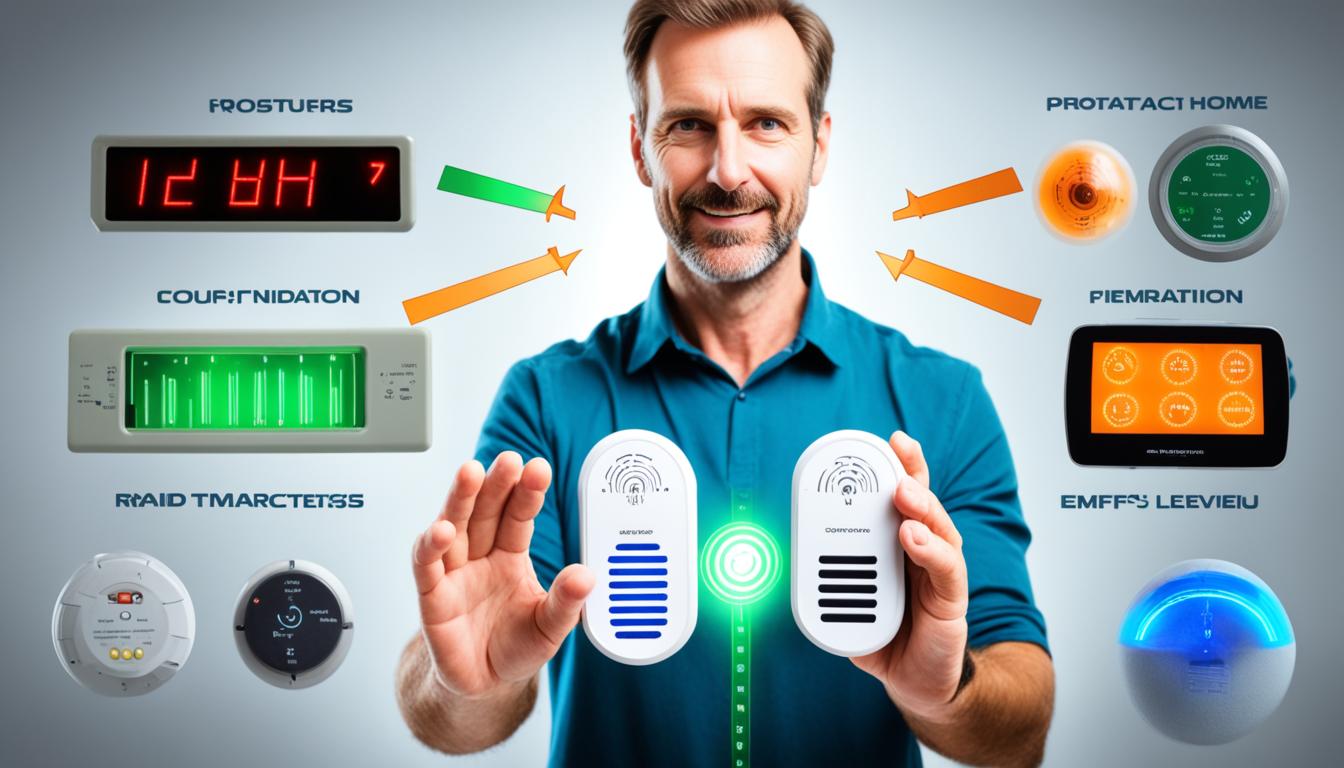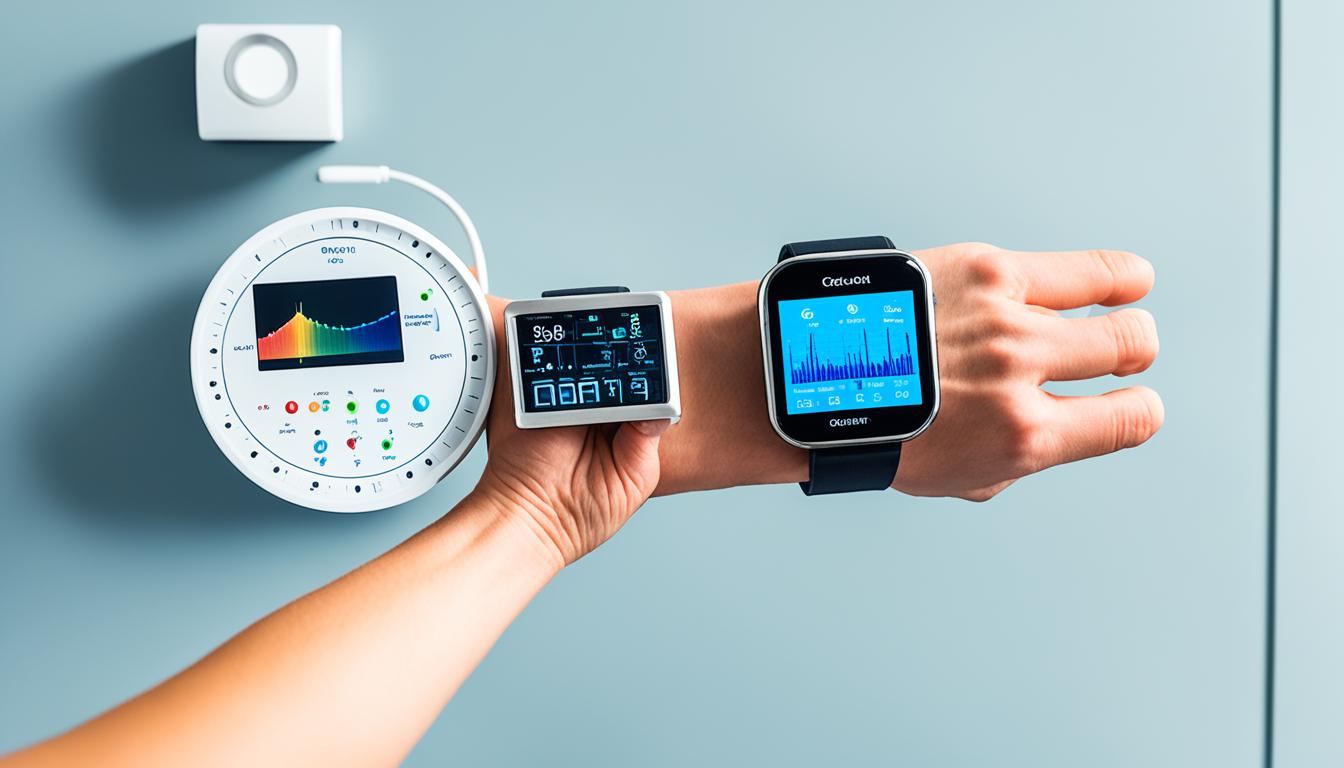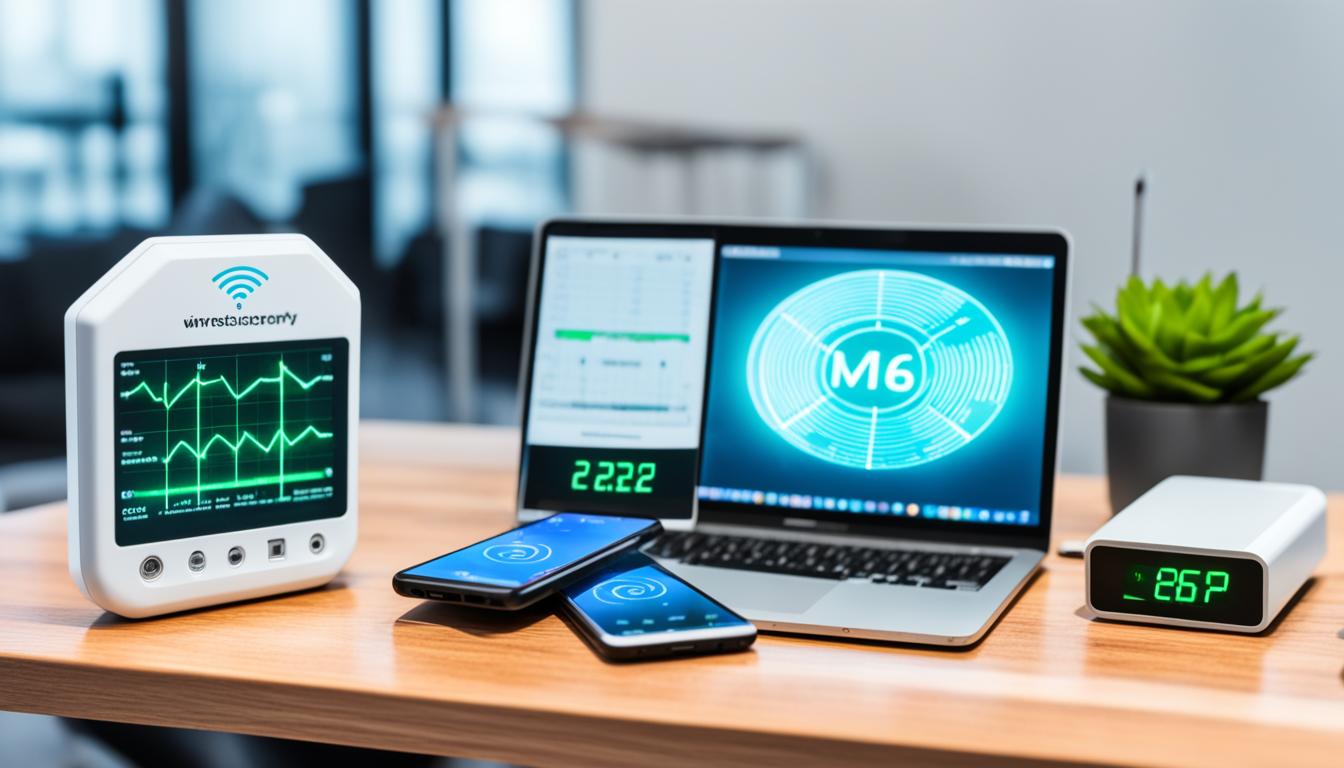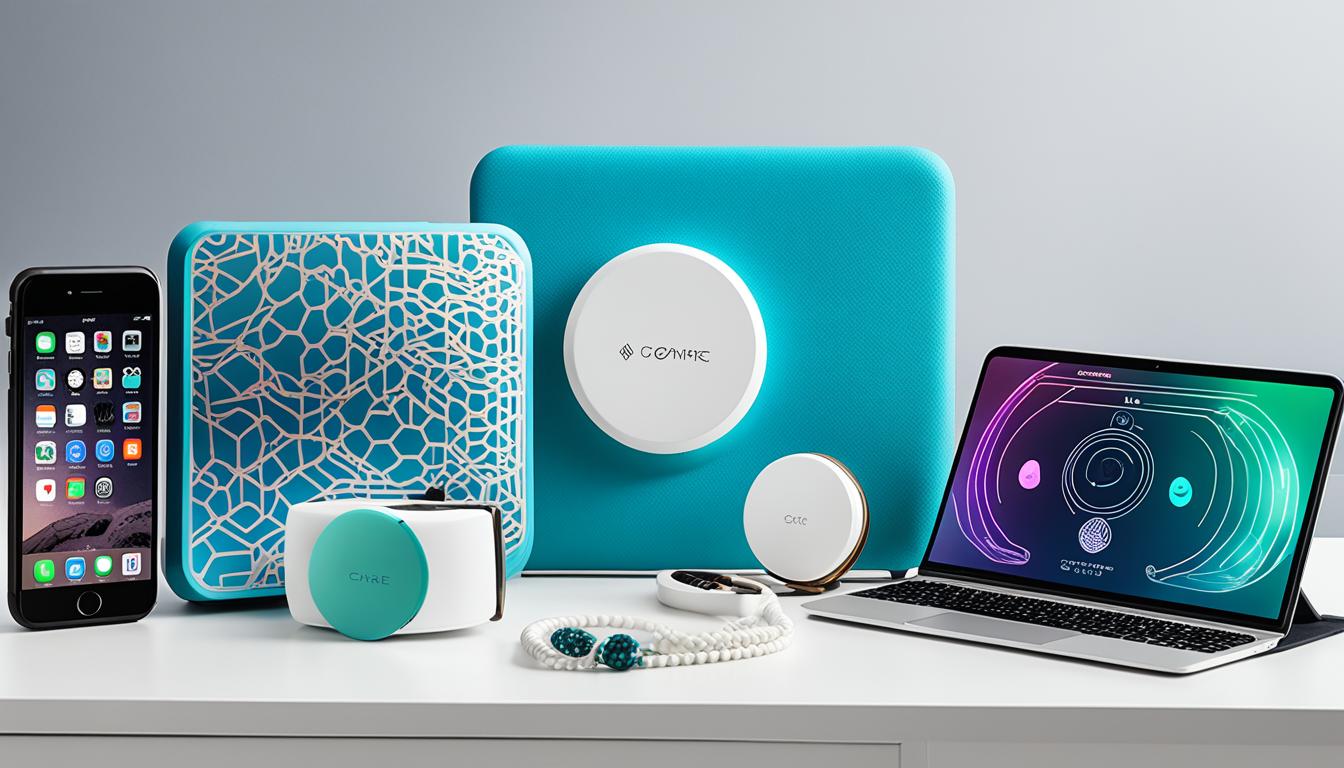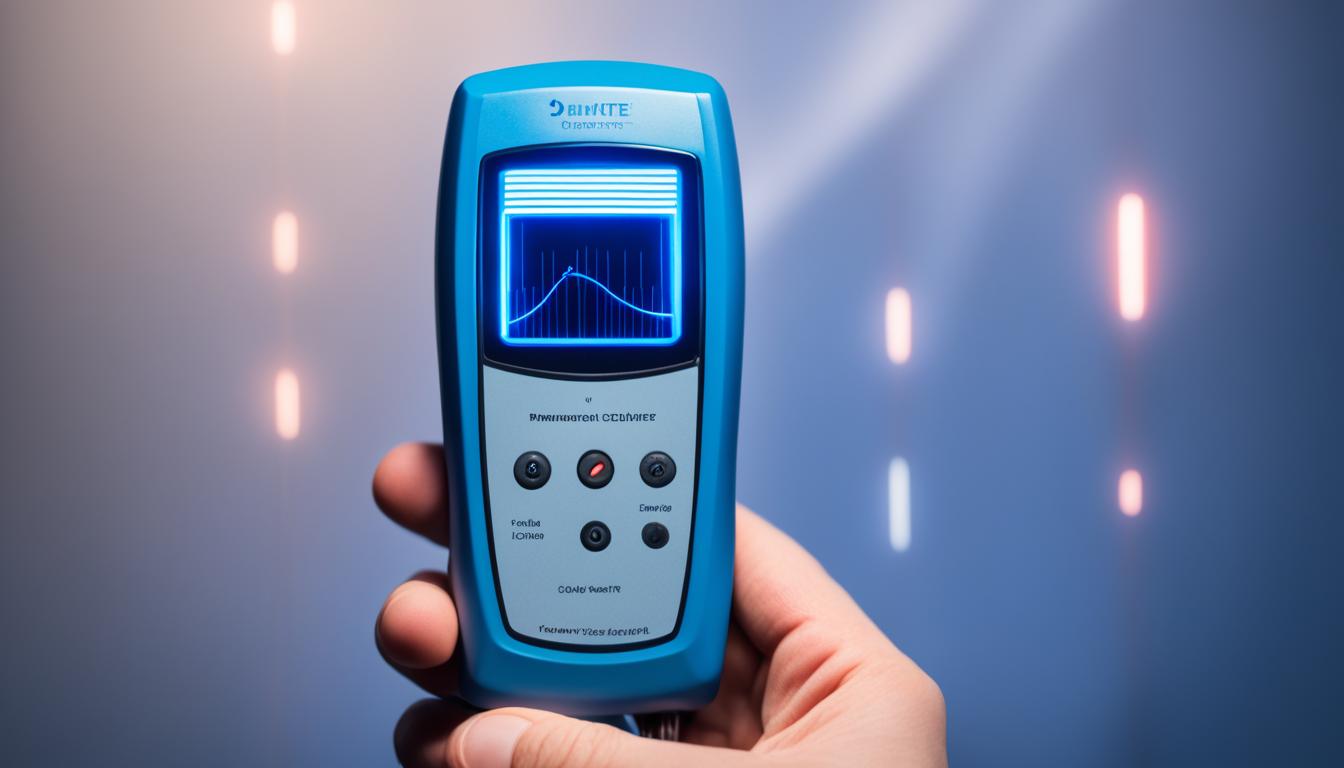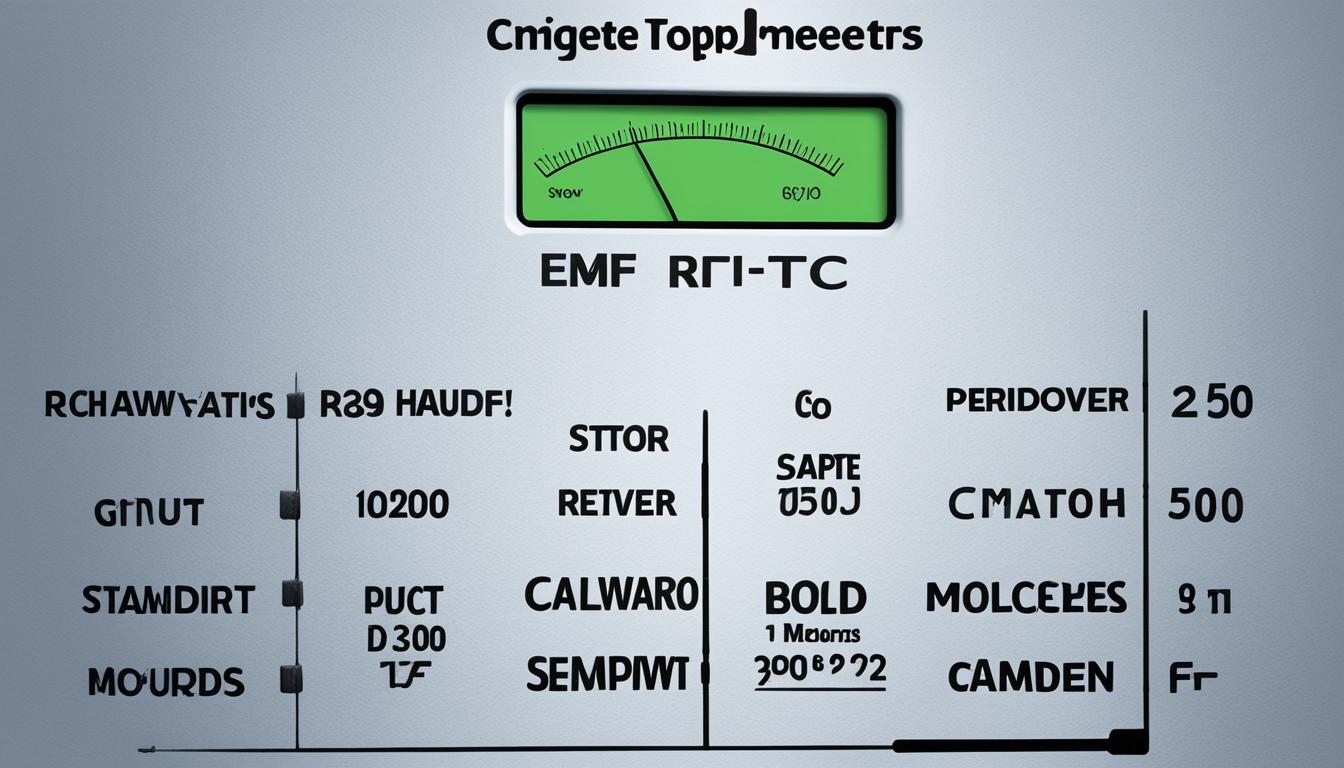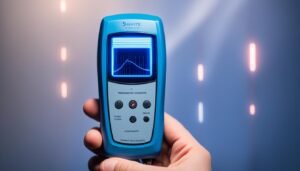Disclosure: This Post Contains Affiliate Links; We earn a commission on purchases.
If you’ve been following our posts here on Atmosure, you’ll know that we highly recommend EMF meters and detectors. In this post, we’ll share our top picks for the best EMF meters and detectors in 2023. We’ll cover different types of EMFs to look out for, the key benefits of using an EMF detector, and why an EMF meter is a valuable tool in your battle against EMF radiation. By the end of this post, you’ll have a clearer understanding of the different types of EMF meters and detectors available, and you’ll be able to choose the best one for your needs.
Key Takeaways:
- Learn about the best EMF meters and detectors in 2023.
- Understand the different types of EMFs and their potential health hazards.
- Discover the benefits of using an EMF detector to reduce exposure.
- Choose the right EMF meter for your needs.
- Protect yourself and your loved ones from the potential health hazards of EMF radiation.
EMF Radiation – A Quick Recap
EMF radiation, also known as electromagnetic field radiation, is a form of energy that is emitted by various sources in our everyday environment. These sources include electronic devices, power lines, and wireless communication technology. While EMF radiation is invisible to the naked eye, it is present all around us.
Exposure to high levels of EMF radiation has raised concerns about potential health hazards. Research has suggested that prolonged and excessive exposure to EMFs could increase the risk of cancer, disrupt sleep patterns, and contribute to various other health issues.
That is why understanding and monitoring EMF radiation in our homes and workplaces is crucial. By measuring and detecting the levels of EMF radiation, we can take proactive steps to reduce our exposure and protect our well-being.
One effective tool for monitoring EMF radiation is an EMF meter, also known as an EMF detector. An EMF meter is a device designed to measure the strength and intensity of electromagnetic fields. It can detect the presence of EMF radiation and provide valuable insights into the levels of electromagnetic radiation in a given area.
An EMF meter can assist individuals in identifying potential sources of EMF radiation and understanding the extent of their exposure. By using an EMF meter, you can gain valuable knowledge about the electromagnetic environment in your surroundings and make informed decisions to minimize your exposure to EMF radiation.
EMF radiation is a topic of concern due to its potential health effects. By utilizing an EMF meter, individuals can take control of their exposure, make informed choices, and create healthier living and working environments.
Common Sources of EMF Radiation
EMF radiation originates from various sources that we encounter on a daily basis. Some of the most common sources of EMF radiation include:
- Electronic devices such as smartphones, laptops, and tablets
- Power lines
- Wi-Fi routers
- Microwave ovens
- Cellular towers
These sources emit different types of EMFs, including electric fields, magnetic fields, and radiofrequency radiation. Each type of EMF has its own characteristics and potential health implications.
| Type of EMF Radiation | Source | Potential Health Hazards |
|---|---|---|
| Electric Fields | Electronic equipment, power cords, electrical wiring | Disruption of sleep patterns, increased stress levels |
| Magnetic Fields | Power lines, electrical appliances, electrical wiring | Increased risk of cancer, impaired immune function |
| Radiofrequency Radiation | Cell phones, Wi-Fi routers, Bluetooth devices | Cellular damage, potential link to cancer |
It is important to note that the potential health hazards of EMFs are still being studied, and the scientific community is actively researching the long-term effects of EMF radiation.
Detecting the Unseen: The Power of EMF Meters
EMF meters are essential tools designed to measure and detect EMF radiation levels in our environment. These handy devices work by sensing magnetic fields, electric fields, and RF fields created by various sources, such as electrical devices, power lines, and wireless devices.
Whether you’re a concerned parent, a health-conscious individual, or simply someone who wishes to live in a safer and healthier environment, using an EMF meter is crucial for protecting yourself and your loved ones. With an EMF detector, you can gain a clearer understanding of the EMF radiation levels in your surroundings and take proactive steps to reduce your exposure.
There are different types of EMF meters available, each specifically designed to measure and detect different aspects of EMF radiation:
- Magnetic Field Meters: Measure the strength of magnetic fields emitted by power lines, electrical wiring, and other sources.
- Electric Field Meters: Measure the strength of electric fields produced by electronic equipment, power cords, and electrical wiring.
- RF Meters: Assess the intensity of RF radiation emitted by cell phones, Wi-Fi routers, and other wireless devices.
- Combination Meters: Combine the features of magnetic field meters, electric field meters, and RF meters to provide comprehensive EMF measurements.
By utilizing these different types of EMF meters, you can accurately detect and assess the various components of EMF radiation. This enables you to make informed decisions and implement effective strategies to minimize your exposure to potentially harmful electromagnetic fields.
Quote:
“An EMF meter is an indispensable tool for anyone looking to create a healthier living environment and minimize their exposure to electromagnetic fields. With the power to detect the unseen, it empowers individuals to take control of their well-being.”
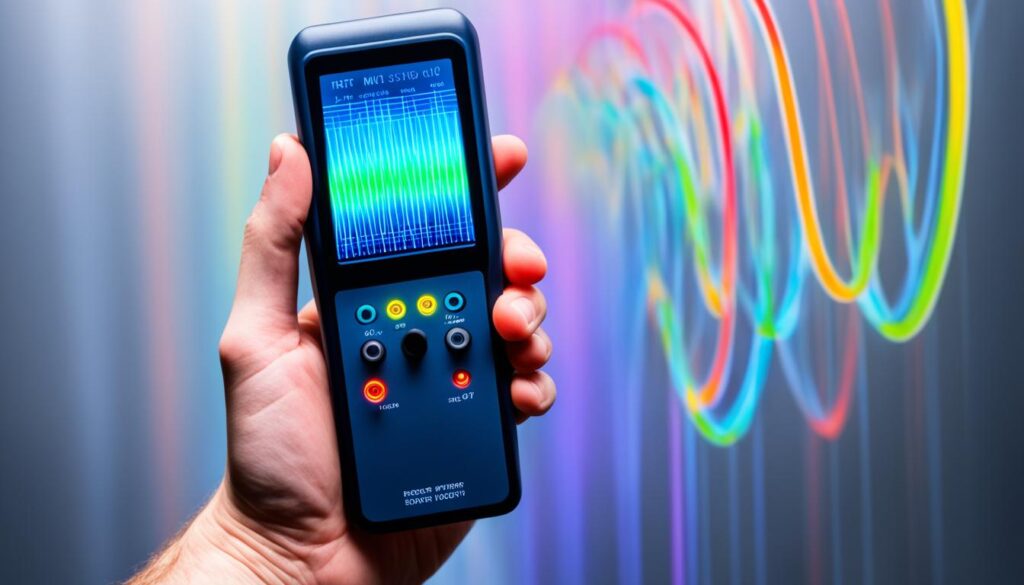
Magnetic Field Meters
Magnetic field meters are essential tools for measuring the strength of magnetic fields emitted by various sources, such as power lines and electrical wiring. These meters play a crucial role in examining the potential health concerns associated with prolonged magnetic field exposure, which has been linked to an increased risk of cancer and other health issues.
By using magnetic field meters, you can accurately measure the magnetic field strength in gauss or tesla units, allowing you to analyze the potential health effects of magnetic field exposure. This enables you to make informed decisions about minimizing your exposure to magnetic fields and mitigating any associated health risks.
The importance of magnetic field meters cannot be overstated, especially considering the numerous sources of EMF radiation in our modern environment. By understanding and monitoring the magnetic fields around you, you can take proactive steps to safeguard your well-being and that of your loved ones.
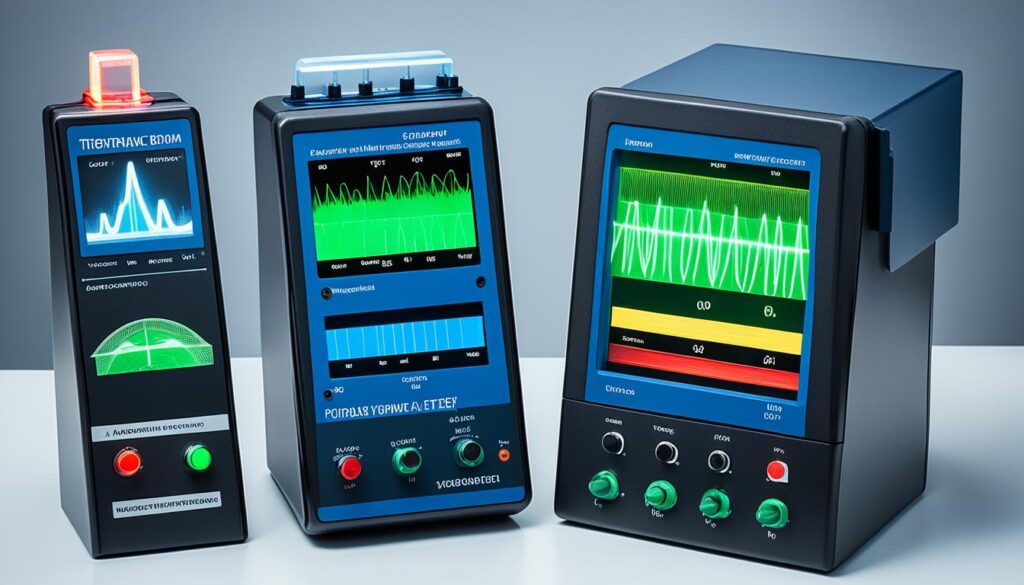
Magnetic Field Meters in Action
Let’s take a closer look at how magnetic field meters work and how they help in measuring magnetic fields:
- Measuring Magnetic Field Strength: Magnetic field meters function by detecting and quantifying the strength and intensity of magnetic fields. Using sensors, these meters can accurately measure the magnetic field strength in gauss or tesla units.
- Identifying Magnetic Field Sources: Magnetic field meters allow you to identify potential EMF radiation sources in your surroundings. By assessing the strength and direction of magnetic fields, you can pinpoint the specific areas or devices that might be emitting high levels of EMF radiation.
- Monitoring Magnetic Field Exposure: Regularly using magnetic field meters enables you to monitor your exposure to magnetic fields over time. This data can help you identify patterns, potential correlations with health concerns, and make informed decisions to mitigate or reduce your exposure.
By using magnetic field meters, you can gain a deeper understanding of the magnetic fields in your immediate environment and take necessary steps to protect yourself and your loved ones from potential health risks associated with magnetic field exposure.
Electric Field Meters
Electric field meters are essential tools for measuring the strength of electric fields. These fields are generated by the movement of electric charges and can originate from various sources, including electronic equipment, power cords, and electrical wiring. By utilizing electric field meters, you can accurately measure electric fields in volts per meter and gain valuable insights into the electromagnetic radiation present in your environment.
One noteworthy feature of electric field meters is their ability to detect both alternating current (AC) and direct current (DC) electric fields. This dual functionality allows you to comprehensively assess the electric field strengths produced by different sources and evaluate potential sources of electromagnetic radiation.
With electric field meters, you can identify areas where electric fields are particularly strong, enabling you to pinpoint potential sources of electromagnetic radiation. Armed with this knowledge, you can take proactive steps to reduce your exposure to such radiation and create a safer living or working environment.
When using electric field meters, it’s crucial to follow the manufacturer’s instructions for accurate measurements. Proper usage ensures reliable data and empowers you to make informed decisions about minimizing your exposure to electromagnetic radiation.
Here’s an image highlighting the importance of using electric field meters:
| Feature | Description |
|---|---|
| Measurement Units | Volts per meter (V/m) |
| Detection Capability | AC and DC electric fields |
| Source Identification | Highlights potential sources of electromagnetic radiation |
By utilizing electric field meters, you can measure electric fields, identify potential sources of electromagnetic radiation, and take proactive steps to reduce your exposure. With a better understanding of the electromagnetic radiation in your environment, you can create a healthier and safer space for yourself and those around you.
Radiofrequency (RF) Meters
RF meters play a crucial role in assessing the strength of RF radiation emitted by cell phones, Wi-Fi routers, and other wireless devices. RF radiation, a form of non-ionizing radiation, has the potential to heat biological tissue and cause adverse effects on human health. To protect ourselves, it is essential to measure and understand the levels of RF radiation in our environment. RF meters allow us to assess the intensity of RF radiation in a specific area or environment and measure its strength in microwatts per square centimeter or volts per meter.
Excessive and prolonged exposure to RF radiation can lead to potential health problems. It is therefore important to have a reliable RF meter to accurately assess and monitor your exposure. By using an RF meter, you can gain valuable insights into the extent of RF radiation in your surroundings and take necessary precautions to limit your exposure, ensuring a safer and healthier living environment for yourself and your loved ones.
When choosing an RF meter, it is essential to consider its accuracy, functionality, and usability. Look for features such as frequency range, sensitivity, and measurement modes to ensure comprehensive assessment capabilities. Additionally, consider the meter’s compatibility with various wireless technologies and its ability to provide real-time measurements for accurate evaluation.
Investing in an RF meter is a proactive step towards safeguarding your well-being. By diligently assessing and managing RF radiation exposure, you can minimize the potential health risks associated with this type of radiation.
Key Advantages of RF Meters:
- Accurately assess the strength of RF radiation emitted by wireless devices
- Measure RF radiation in microwatts per square centimeter or volts per meter
- Aid in identifying potential health problems associated with RF radiation
- Enable informed decision-making to limit RF radiation exposure
To illustrate the importance of RF meters in assessing the potential health risks associated with RF radiation, consider the following quote:
“RF meters are vital tools in evaluating the intensity of RF radiation. They provide valuable data that enables individuals to make informed choices about their exposure and take necessary steps to protect their health.” – Dr. Helen Thompson, EMF Researcher
To further understand the significance of RF meters, let’s take a look at the comparison table below:
| RF Meter Model | Frequency Range | Sensitivity | Measurement Modes |
|---|---|---|---|
| RF Pro+ | 10 MHz – 8 GHz | 0.001 V/m – 20 V/m | Peak, Average, and Hold |
| EMFMaster+ | 100 kHz – 6 GHz | 0.001 µW/cm² – 2000 µW/cm² | Single, Max, and Hold |
| SafeGuardPro | 1 MHz – 10 GHz | 0.005 µW/m² – 3000 µW/m² | Average and Max |
As seen in the table, different RF meter models offer varying frequency ranges, sensitivities, and measurement modes. It is important to carefully evaluate these factors and choose an RF meter that best suits your needs and provides accurate readings for effective assessment and management of RF radiation exposure.
Conclusion
Investing in the right EMF meter is crucial for protecting yourself and your loved ones from potential health hazards associated with EMF radiation. Throughout this ultimate guide, we explored different types of EMF meters and detectors, including magnetic field meters, electric field meters, RF meters, and combination meters. By understanding the features and capabilities of these meters, you can make an informed decision when choosing the best EMF meter for your needs.
When purchasing an EMF meter, it’s essential to consider factors such as accuracy, features, and brand reputation. The accuracy of an EMF meter ensures precise measurements of electromagnetic fields, enabling you to gauge the levels of radiation accurately. Look for meters with advanced features like data logging, frequency range, and adjustable sensitivity to cater to your specific requirements.
In our review of the best EMF meters available in 2023, we highlighted top-performing models such as the Trifield TF2, Cornet ED88T Plus, EMFields Acoustimeter AM11, Erikhill EMF Meter, GQ EMF-390, Safe and Sound Pro II, and Wintact EMF Meter. These brands have demonstrated reliability, accuracy, and user satisfaction, making them excellent choices for anyone concerned about EMF radiation exposure.
By utilizing this comprehensive EMF meter buying guide and selecting from the top-notch brands mentioned above, you can gain a better understanding of EMF radiation levels in your environment and take necessary steps to minimize your exposure. Prioritizing your well-being and that of your loved ones is always a wise decision when it comes to countering the potential health risks of EMF radiation.
Source Links
- https://emfacademy.com/best-emf-meters-and-detectors/
- https://atmosure.com/blogs/stories/emf-meters-and-detectors
- https://www.admnucleartechnologies.com.au/blog/guide-buying-emf-meter

Subscribe to Our Newsletter
